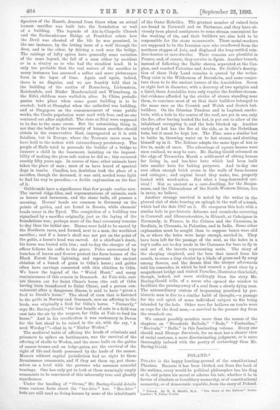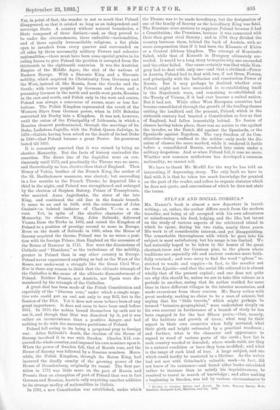POLAND.* POLAND is the happy hunting-ground of the constitutional Pharisee.
Because it has been blotted out from the book of the nations, every would-be political philosopher has his fling at it, and points his moral or adorns his tale, whether it be in favour of absolute or hereditary monarchy, or of constitutional monarchy, or of democratic republic, from the story of Poland.
* Poland. By W. R. Idorfill, M.A. " Tho Story of the Nations" Series. London : T. Fisher Ilnwin. Yet, in point of fact, the wonder is not so much that Poland disappeared, as that it existed so long as an independent and sovereign State. I country without natural boundaries, a State composed of three distinct—and, as they proved to be under the circumstances, three unfusible—nationalities, and of three equally irreconcilable religions, a flat plain open to invaders from every quarter and surrounded on all sides by three necessarily military Powers and cohesive nationalities,—there must have been some special genius in its ruling forces to give Poland the position it occupied from the thirteenth to the eighteenth centuries. It was the Austrian Empire of the Middle Ages ; the sink of the nations of Eastern Europe. With a Slavonic King and a Slavonic nobility, which acquired its Christianity from Germany and the West, instead of, like Russia, from the Greeks and the South; with towns peopled by Germans and Jews, and a peasantry German in the north and north-west parts, Russian in the east and south, and Polish only in the west and centre, Poland was always a concourse of atoms, more or less for- tuitous. The Polish Kingdom represented the revolt of the Western Slays from German power, when in 1076 Boleslas converted his Duchy into a Kingdom. It was not, however, until the union of the Principality of Lithuania, in which a Russian element predominated, through the marriage of its Duke, Ladislaus Jagiello, with the Polish Queen Jadwiga, in 1376—Galicia having been seized on the death of its last Duke in 1340—that Poland became a great Power. Its greatness lasted till 1695.
It is commonly asserted that it was ruined by being an elective Monarchy. But the facts of history contradict the assertion. The direct line of the Jagiellos went on con- tinuously until 1572, and practically the Throne was no more, and theoretically no less, elective than that of England. Then Henry of Valois, brother of the French King, the author of the St. Bartholomew massacre, was elected ; but succeeding in a few months to the French Throne, he departed like a thief in the night, and Poland was strengthened and enlarged by the election of Stephen Batony, Prince of Transylvania, who married Anna Jagiellonka, the sister of the late King, and continued the old line in the female branch. It came to an end in 1668, with the retirement of John Casimir—a belated imitator of Charles V.—to a con- vent. Yet, in spite of the elective character of the Monarchy, its elective King, John Sobieski, delivered Vienna from the Turks in 1682, and raised the Kingdom of Poland to a position of prestige second to none in Europe. Even on the death of Sobieski in 1695, when the House of Saxony acquired the throne, Poland was in no worse a posi- tion with its foreign Prince, than England on the accession of the House of Hanover in 1715. Nor were the dissensions of Ciatholic and "Dissident," or the turbulence of the nobility, greater in Poland than in any other country in Europe. Poland never experienced anything as bad as the Wars of the Roses, nor underwent a struggle like the Great Civil War. Nor is there any reason to think that the ultimate triumph of the Catholics is She cause of the ultimate dismemberment of Poland. Neither France, nor Austria, nor Spain were dis- membered by the triumph of the Catholics.
A great deal has been made of the Polish Constitution and especially of the " liberum veto," under which a single nega- tive vote could put an end not only to any Bill, but to the Session of the Diet. Yet it does not seem to have been of any great importance. It does not seem to have been used before 1651. In 1670, the nobles bound themselves by oath not to use it, and though that Diet was dissolved by it, yet it was rather an inconvenience than a positive danger, and had nothing to do with the successive partitions of Poland.
Poland fell owing to its being a perpetual prey to foreign war. After Sobieski's death, the election of the House of Saxony involved it in war with Sweden. Charles XII. con- quered the whole country, and imposed his own nominee upon it. When the power of Sweden fell, that of Russia rose, and the House of Saxony was followed by a Russian nominee. Mean- while, the Polish Kingdom, through its Saxon King, had incurred the deadly enmity of the growing power of the House of Brandenburg, originally its vassal. The first par- tition in 1772 was little more on the part of Russia and Prussia than an absorption of part of Poland that was in fact German and Russian, Austria only acquiring another addition to its strange medley of nationalities in Galicia.
In 1791, a new Constitution was established, under which the Throne was to be made hereditary, but the designation of one of the family of Saxony as the hereditary King was fatal. The Russians were anxious to suppress Poland because it had a Constitution; the Prussians, because it was connected with their then great rival Saxony ; and in 1794 they divided the country between them, behind the back of Austria, with no more compunction than if it had been the Khanate of K hiva or a Central African kingdom. The attempt of Kosciusko failed, while that of Kossuth in Hungary ultimately suc- ceeded. It would be a long story to inquire why one succeeded and the other failed. One cause certainly was that while Hun- gary had to deal with only one—and that a civilised—Power in Austria, Poland had to deal with two, if not three, Powers, and principally with the barbarian and remorseless Power of Russia. But it may perhaps be doubted whether even Poland might not have succeeded in re-establishing itself in the Napoleonic wars, and remaining re-established at the Treaty of Vienna, if it had ever become a united nation. But it had not. While other West European countries had become consolidated through the growth of the trading classes uniting the landlord and the peasant, Poland, which in the sixteenth century bad boasted a Constitution as free as that of England, had fallen lamentably behind. No fusion of classes having taken place, there was no nation to rise against the invader, as the Dutch did against the Spaniards, or the Spaniards against Napoleon. The very freedom of its Con- stitution—being confined to the nobles—only made the dis- union of classes the more marked, while it rendered it feeble before a consolidated Russia, crushed into union under a military despotism. And so when Poland fell, it rose no more. Whether now common misfortune has developed a common nationality, we cannot tell.
We have to thank Mr. Morfill for the way he has told an interesting, if depressing, story. The only fault we have to find with it is that he takes too much knowledge for granted on the part of the reader, and refers to organic statutes which he does not quote, and conventions of which he does not state the terms.



































 Previous page
Previous page